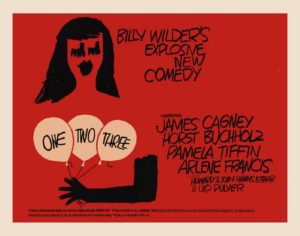Even the name “Cold War” brings to mind long, slow, depressed periods of time. Yet, Billy Wilder’s One, Two, Three offers constant humor and a spin on post-war Germany that I found mostly amusing, but often confusingly devoid of references to Nazis. When someone makes an uncomfortable parody of the U.S.’s current political state I hope a spade is called a spade.
 One, Two, Three
One, Two, Three
Directed by Billy Wilder
Starring James Cagney, Horst Buchholz,
Pamela Tiffin, Arlene Francis
December 15, 1961
MacNamara (James Cagney) runs the Berlin branch of the Coca-Cola factory and is itching to move up in the company. He’s enjoying “fringe benefits” with his secretary, trying to keep his wife and two children just happy enough that they don’t abandon him, and is adjusting to post-war Berlin with some difficulty. Everything seems to be on-track until the Georgia headquarters manager asks him to watch his teenage daughter for a few weeks. Scarlet (Pamela Tiffin) is loud, flirtatious, and determined to get into trouble.
After she goes missing for a night, Scarlet comes back with some news for her guardian, namely that she is now married to a man from East Berlin. They met when she was arrested “Because I was taking pictures. And then this boy, he was in the parade, he said to the police man I shouldn’t be arrested, I should be pitied, because I was a typical bourgeois parasite and the rotten fruit of a corrupt civilization. So naturally, I fell in love with him.”
One, Two, Three pokes fun at everyone, while still managing to push a certain level of U.S. American exceptionalism. Everyone is a fool, except MacNamara (Cagney) who is a careful conductor of events and, essentially, a con-man. He sees the trouble that this will cause him and his potential rise to the top of Coke, and he warps it until no one knows what’s true and what’s a farce. Each step of the way he must battle Scarlet’s youthful foolishness and her new husband, Otto (Horst Buchholz), who is extremely dedicated to the Communist party. At least until he realizes that they’re just as corrupt as any other political movement.
At moments this felt close to home. I’ve been listening to political fanatics on all sides of the spectrum tout the superiority of their own parties and candidates my entire adult life in an effort to oppose the other side they become blinded to the failings in their own camp. (See this last disastrous election.)
While I found myself enjoying most of the jokes, especially those made by MacNamara’s wife Phyllis (Arlene Francis), there was still a lot that left a bad taste in my mouth. Anti-Polish and anti-Russian sentiment, as well as blatant disrespect for the Communist party. And, of course, standard misogyny, with lines like:
Borodenko: When will papers be ready?
C.R. Macnamara: I’ll put my secretary right to work on it.
Mishkin: Your secretary? She’s that blond lady?
C.R. Macnamara: That’s the one.
Peripetchikoff: [after conferring with the others] You will send papers to East Berlin with blond lady in triplicate.
C.R. Macnamara: You want the papers in triplicate, or the blond in triplicate?
Peripetchikoff: See what you can do.
For a movie based in Berlin shortly after the war, there’s a surprising lack of jokes about Hitler. There are a few mentions, always pointing out how embarrassing, and potentially dangerous, it is to be associated with the Third Reich. Otherwise, the film focuses mostly on the political divide between East and West Germany, seen simply as Communists vs Capitalists.
Otto: I will not have my son grow up to be a capitalist.
Scarlet: When he’s 18 he can make his mind up whether he wants to be a capitalist or a rich communist.
Now, decades after the Cold War, I can feel comfortable laughing at the ceaseless jokes Wilder offers the audience about the political tension. However, the team was filming this movie while the Berlin Wall was being built, and I can imagine for anyone in Germany at the time, this film would not have been perceived with such a generous eye. Much like if someone were to release a parody of the Trump administration in the next year or so while he was still in office. It’s too soon. When the film was released, it recorded a loss of $1.6 million, perhaps due to the new Wall.
I didn’t learn what I’d expected to from One, Two, Three, but I was pleasantly surprised by the often clever jokes and traditionally humorous set-ups. It did highlight the tension between classes and ideologies, and reveal what I’ve always felt to be the case: no political party is as glamorous/successful/pure as it seems.

